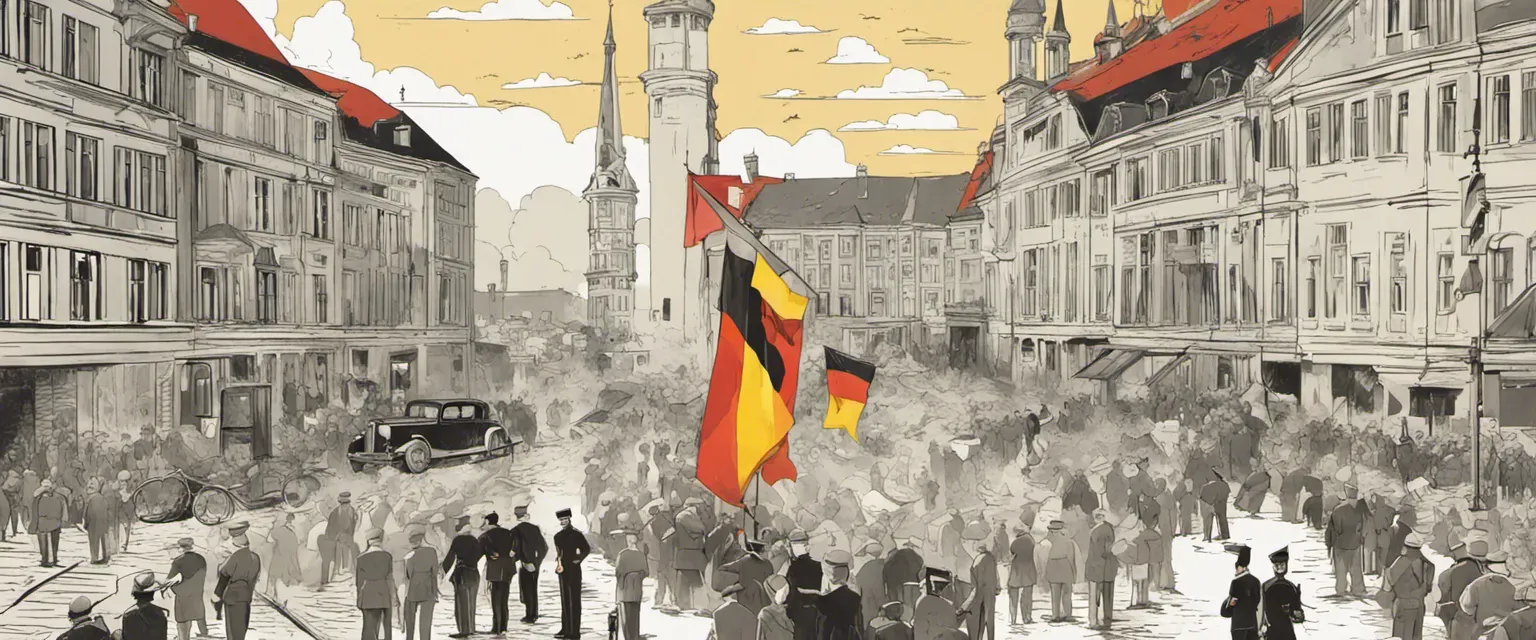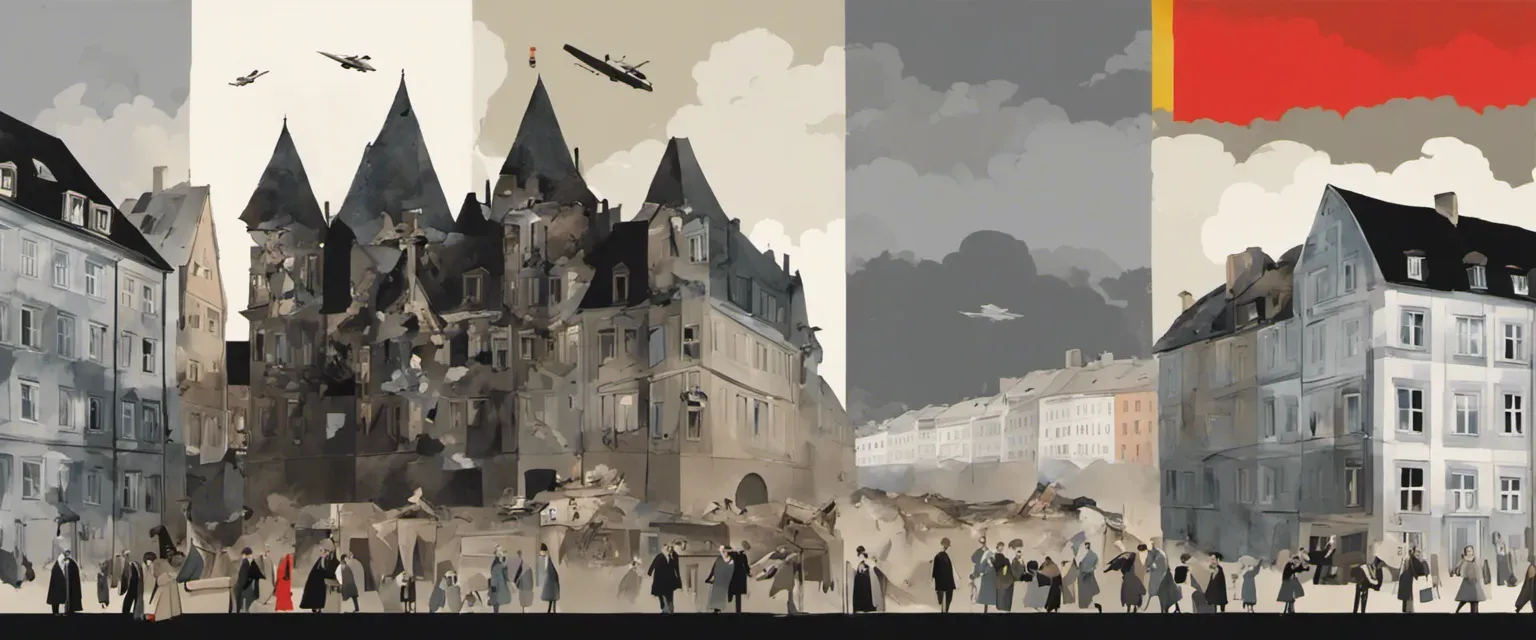
Chapter 1 What's The Rise And Fall Of The Third Reich
"The Rise and Fall of the Third Reich" is a historical non-fiction book written by William L. Shirer. It was first published in 1960 and details the history of Nazi Germany, from Adolf Hitler's rise to power in the 1930s to the collapse of the Nazi regime in 1945. The book explores Hitler's ideology, his foreign policy, the atrocities committed by the Nazi regime, and the events leading up to World War II. Shirer, an American journalist who covered the Nazi regime firsthand, provides a comprehensive account of the rise and fall of one of the most notorious periods in history.
Chapter 2 Why is The Rise And Fall Of The Third Reich Worth Read
"The Rise and Fall of the Third Reich" by William L. Shirer is worth reading for several reasons:
- Comprehensive and Detailed Account: This book provides a comprehensive and highly detailed account of the Nazi regime, from its rise to power in 1933 to its fall in 1945. Shirer, a journalist and witness to the events, extensively researched primary sources and documents while writing this book. As a result, the reader gains an in-depth understanding of the political, economic, and social factors that allowed Hitler and the Nazis to seize and maintain power.
- Historical Significance: The Third Reich is one of the most infamous and consequential periods in human history. Understanding the events and ideologies that led to the rise of Hitler is crucial to understanding the larger context of World War II and the Holocaust. Shirer's book weaves together historical narratives with personal anecdotes and eyewitness accounts, providing a vivid description of the era and its profound impact on the world.
- Analytical Perspective: Shirer not only presents the facts but also provides an analytical perspective on the motivations and decision-making processes of Hitler and other key figures. He delves into Hitler's personal life, background, and psychological characteristics, offering valuable insights into the individual behind the Nazi machinery. This approach humanizes the narrative and helps the reader grasp how such a dark regime could emerge and endure.
- Engaging Writing Style: Despite being a scholarly work, Shirer's writing style is engaging and accessible to general readers. He avoids excessive academic jargon and presents complex historical events in a cohesive and understandable manner. This book, running over 1,200 pages, keeps the reader captivated throughout its entirety.
- Enduring Relevance: "The Rise and Fall of the Third Reich" remains an essential read today due to its relevance in understanding the dangers of authoritarianism, the consequences of unchecked nationalism, and the impact of propaganda on manipulating public opinion. The lessons from this dark era continue to resonate and serve as a reminder of the importance of safeguarding democracy and human rights.
Overall, "The Rise and Fall of the Third Reich" is worth reading for its meticulous research, engrossing narrative, and historical significance. It remains a seminal work on Nazi Germany and provides essential insights into one of the darkest periods of human history.
Chapter 3 The Rise And Fall Of The Third Reich Summary
"The Rise and Fall of the Third Reich" by William L. Shirer is a comprehensive historical account of Nazi Germany, documenting its rise to power, its peak during World War II, and its eventual downfall.
The book begins by examining the political, economic, and social factors that contributed to Adolf Hitler's rise to power in Germany in the early 1930s. It explores the weaknesses of the Weimar Republic and the disillusionment of the German people, which allowed Hitler and his Nazi Party to gain support and eventually seize control of the government.
Shirer delves into Hitler's consolidation of power, including his implementation of totalitarian policies, his manipulation of propaganda, and his suppression of opposition. The book also delves into the persecution of various groups, such as Jews, homosexuals, disabled individuals, and political dissidents, providing a chilling account of the horrors of the Nazi regime.
The narrative then shifts to the events leading up to World War II, including Hitler's aggressive foreign policy, his occupation of neighboring countries, and the diplomatic tensions that ultimately led to the outbreak of war.
Throughout the book, Shirer provides detailed accounts of key events during the war, including Nazi Germany's initial successes, such as the invasion of Poland and the fall of France, as well as its eventual defeats, such as the Battle of Stalingrad and the Allied invasion of Normandy.
The book concludes with the unraveling of the Third Reich, as the Allied forces closed in on Germany from all sides. Shirer covers Hitler's decline in health and mental stability, the German resistance movements, and the eventual surrender of Germany in 1945.
Overall, "The Rise and Fall of the Third Reich" is a comprehensive and chilling account of Nazi Germany, offering a detailed examination of Hitler's rise to power, the atrocities committed during his regime, and the ultimate downfall of the Third Reich.

Chapter 4 The Rise And Fall Of The Third Reich Author
William Lawrence Shirer was an American journalist, war correspondent, and author. He was born on February 23, 1904, in Chicago, Illinois, and passed away on December 28, 1993, in Boston, Massachusetts.
Shirer released his most significant and well-known book, "The Rise and Fall of the Third Reich: A History of Nazi Germany," in 1960. It is an extensive historical account of the Nazi regime from Adolf Hitler's rise to power in 1933 to Germany's collapse in 1945. The book is highly regarded for its extensive research, including personal experiences and firsthand accounts, making it a seminal work on Nazi Germany.
Apart from "The Rise and Fall of the Third Reich," Shirer wrote several other books. Some notable ones include:
- "Berlin Diary: The Journal of a Foreign Correspondent 1934-1941" (1941): This book is a collection of Shirer's diary entries during his time as a foreign correspondent in Berlin. It provides an eyewitness account of the rise of Hitler and the events leading up to World War II.
- "The Collapse of the Third Republic: An Inquiry into the Fall of France in 1940" (1969): In this work, Shirer examines the causes and factors contributing to the swift downfall of France during World War II.
- "The Nightmare Years: 1930-1940" (1984): This memoir covers Shirer's experiences as a foreign correspondent during the tumultuous 1930s, including his time reporting from Nazi Germany.
- "Gandhi: A Memoir" (1986): Shirer's biography on Mahatma Gandhi explores the life and accomplishments of the renowned Indian leader.
"The Rise and Fall of the Third Reich" remains Shirer's most acclaimed and internationally recognized work. Multiple editions of the book have been published over the years, including revised and expanded editions. The best edition to refer to would be the most recent version, as it would incorporate any new insights, corrections, or additional material Shirer may have added or revised in subsequent editions authorized before his death in 1993.
Chapter 5 The Rise And Fall Of The Third Reich Meaning & Theme
The Rise And Fall Of The Third Reich Meaning
"The Rise and Fall of the Third Reich" is a historical account written by journalist William L. Shirer, documenting the history of Nazi Germany from its inception under Adolf Hitler to its eventual downfall. The book examines the political, social, and economic factors that led to the rise of Hitler and the Nazi Party, as well as the subsequent consequences and human cost of their reign.
The title itself suggests the cyclical nature of the Nazi regime, from its ascent to power to its eventual collapse. "Rise" refers to the initial period of Nazi Germany's consolidation of power, during which Hitler exploited internal divisions, economic instability, and nationalistic sentiments to gain support and establish a totalitarian state. The book delves into the manipulative tactics used by Hitler and his inner circle to secure dominance over Germany and control every aspect of society.
The "Fall" in the title refers to the ultimate failure and destruction of the Third Reich. Shirer chronicles the expansionist ambitions and military conquests that led Germany into World War II, as well as the atrocities committed by the Nazis during the Holocaust. The book extensively discusses the horrors of Nazi warfare, crimes against humanity, and the collective responsibility of the German people.
Overall, "The Rise and Fall of the Third Reich" examines the rise and ultimate demise of the Nazi regime, shedding light on the factors that contributed to its ascendancy and subsequent collapse. It analyzes the consequences of unchecked nationalism, propaganda, and authoritarianism, serving as a cautionary tale and reminder of the dangers of intolerance and totalitarianism.
The Rise And Fall Of The Third Reich Theme
The main theme of "The Rise and Fall of the Third Reich" by William L. Shirer is the exploration of the factors and events that led to the rise of the Nazi regime and its ultimate downfall.
- Rise of Nazi Germany: The book delves into the background conditions that allowed the National Socialist German Workers' Party, led by Adolf Hitler, to gain power in Germany. It examines the economic, political, and social circumstances that contributed to the popularity and support for the Nazi party among the German people.
- Hitler's leadership and ideology: The book explores Adolf Hitler's role as the driving force behind the Nazi regime. It delves into his charismatic leadership style, his persuasive oratory skills, and his radical ideology, which was rooted in racism, nationalism, and anti-Semitism. The book highlights how Hitler's ideology shaped the policies and actions of Nazi Germany.
- Nazi propaganda and control: Another significant theme is the extensive use of propaganda by the Nazi regime to cultivate support, manipulate public opinion, and control information. It explores how Hitler and his propaganda minister, Joseph Goebbels, effectively used media, visual arts, and speeches to promote the Nazi message and maintain their grip on power.
- Expansion and aggression: The book examines the aggressive foreign policy pursued by Nazi Germany, including the annexation of Austria, the occupation of Czechoslovakia, and the invasion of Poland. It reveals Hitler's ambitions for territorial expansion and the establishment of a new order in Europe.
- World War II and the Holocaust: The theme of war and genocide looms large in the book as it explores the Nazi's role in provoking and escalating World War II. It also delves into the depths of human cruelty and records the systematic persecution and extermination of millions of Jews and other minority groups during the Holocaust.
- The downfall of the Third Reich: The book chronicles the decline and ultimate defeat of the Nazi regime. It analyzes the military mistakes, strategic errors, and internal conflicts that led to the weakening and eventual collapse of Hitler's regime. The theme of justice and accountability is also explored as the book examines the postwar trials and punishment of Nazi war criminals.
Overall, the main theme of "The Rise and Fall of the Third Reich" is the examination of the rise, establishment, and eventual destruction of the Nazi regime, while shedding light on the ideologies, propaganda, and aggression that defined this dark period in history.

Chapter 6 Other Accessible Resources
- "The Rise and Fall of the Third Reich: A History of Nazi Germany" by Schonberg William
- "Articles on Books about Nazism, Including: Mein Kampf, Inside the Third Reich, the Rise and Fall of the Third Reich, the Lightning and the Sun, Pilgrimage (Book), the Occult Roots of Nazism, Hitler's Terror Weapons, Hitlers Bombe" by William L. Shirer
- "The Rise and Fall of the Third Reich: A History of Nazi Germany" by William L. Shirer (Abridged Edition)
- "The Rise and Fall of the Third Reich: The History of Nazi Germany" by Charles River Editors
- "The Rise and Fall of the Third Reich: The History of Nazi Germany" by Geoffrey Jukes
- "The Rise and Fall of the Third Reich: A History of Nazi Germany" by Amir Levine
- "The Rise and Fall of the Third Reich: A History of Nazi Germany" by William L. Shirer and Ron Rosenbaum (Introduction)
- "The Rise and Fall of the Third Reich: A History of Nazi Germany" by William S. LaSor
- "The Rise and Fall of the Third Reich: A History of Nazi Germany" by William R. Green
- "The Rise and Fall of the Third Reich: A History of Nazi Germany" by William L. Shirer (eBook edition)
The Rise And Fall Of The Third Reich quotes as follows:
- "Powerful figures do not rise within a vacuum; they rise because circumstances permit them to, because there is something in those circumstances that allows them to exploit their narcissism, their ambition, their ruthlessness."
- "The road to power is paved with hypocritical promises, cunning tactics, and an unwavering determination to achieve one's goals at any cost."
- "Evil triumphs when good people choose to remain silent, when they ignore the warning signs and disregard the growing threat."
- "Propaganda is a powerful tool in the hands of those who seek to manipulate the masses. It can be used to create a hero out of a villain, to turn lies into truth, and to fuel blind loyalty among the people."
- "Totalitarian regimes thrive on the suppression of dissent and the elimination of opposition. They establish a climate of fear, where individuals are afraid to speak out against the atrocities being committed."
- "The Third Reich's unshakeable belief in its own superiority and its ruthless pursuit of its goals led to the devastation of entire nations and the loss of millions of lives."
- "The rise of Adolf Hitler and the Nazi Party serves as a chilling reminder of the dangers of unchecked power and the consequences of a society that allows itself to be swayed by extremist ideologies."
- "The Holocaust stands as a stark reminder of the depths to which humanity can sink when hatred and prejudice are given free rein."
- "History has the power to teach us valuable lessons, but only if we are willing to listen and learn from the mistakes of the past."
- "The collapse of the Third Reich serves as a testament to the resilience of the human spirit and the ultimate triumph of justice over tyranny."
Chapter 8 Similar Books Like The Rise And Fall Of The Third Reich
- "The Diary of a Young Girl" by Anne Frank - This powerful and heartbreaking memoir offers a firsthand account of Nazi-occupied Holland through the eyes of Anne Frank. It provides a deeply personal perspective on the Holocaust and serves as a poignant reminder of the resilience of the human spirit.
- "Ordinary Men: Reserve Police Battalion 101 and the Final Solution in Poland" by Christopher R. Browning - This meticulously researched book delves into the psychological and moral dilemmas faced by ordinary German men who were transformed into killers during the Holocaust. Browning's work offers invaluable insights into the nature of human obedience and the consequences of unchecked power.
- "The Origins of Totalitarianism" by Hannah Arendt - In this seminal work, Arendt examines the rise of totalitarian regimes in the 20th century, drawing connections between the Nazi regime, Stalinism, and broader historical and philosophical factors. Her analysis sheds light on the sociopolitical climate that allowed the Third Reich to gain power and provides an important framework for understanding totalitarianism.
- "Night" by Elie Wiesel - Wiesel's memoir recounts his experiences as a young Jewish boy during the Holocaust, including his imprisonment in Auschwitz and Buchenwald. "Night" immerses readers in the horrors of the concentration camps, offering a poignant exploration of faith, identity, and the indomitable human will to survive.
- "Man's Search for Meaning" by Viktor E. Frankl - Frankl, an Austrian psychiatrist and Holocaust survivor, reflects on his experiences in concentration camps and explores the meaning of life in the face of suffering. This philosophical masterpiece highlights the importance of finding purpose and embracing resilience in the darkest of circumstances. Frankl's insights continue to resonate and inspire readers to find meaning in their own lives.
These five books, in addition to the thought-provoking "The Rise And Fall Of The Third Reich" by William L. Shirer, offer a comprehensive understanding of the Holocaust, its origins, and the enduring human experiences associated with it. They provide crucial historical context, personal narratives, and philosophical reflections that combine to create a well-rounded exploration of this dark chapter in human history.

